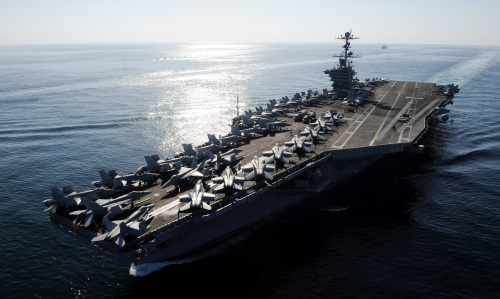
(AP-Yonhap News)
South Korea is caught between a rock and a hard place as it is dealing with a tough decision on whether to fully join the U.S-led sanctions against Iran.
With its “strategic alliance” with Washington deepening, Seoul is under a growing pressure to be in tune with its anti-Tehran moves. But South Korea apparently fears that the moves could bring about a negative impact on its economy.
While gauging possible economic ramifications, Seoul is concerned that its refusal to join the tougher sanctions could hamper its efforts to denuclearize North Korea and make it appear to have a “double standard,” analysts said.
Recent news reports said that Seoul plans to request that the U.S. make an exception for it in its application of the National Defense Authorization Act.
President Barack Obama signed the act on Dec. 31 to toughen sanctions over Iran’s controversial nuclear programs. It includes the so-called Kirk-Menendez amendment designed to cut off international transactions with Iran’s central bank.
“As the act was signed by President Obama and took effect, there should be coordination over it between Seoul and Washington, considering that the sanctions could affect our local companies,” a senior government official said, declining to be named.
“It is premature to talk about the issue over whether to reduce our oil imports from Iran. We need more discussion over it among related ministries.”
In a regular press briefing, Foreign Ministry spokesperson Cho Byung-je stressed that Seoul will be in line with the international non-proliferation efforts.
“In Northeast Asia, North Korean nuclear issues are the biggest security challenge. In this regard, the Seoul government is interested in maintaining and strengthening the international non-proliferation system. For this, we are in close cooperation with Washington,” he told reporters.
In 2009, the leaders of the two allies agreed to transform their military alliance into a global, multifaceted and value-based partnership, a move to deal with a variety of peninsular, regional and global challenges together.
But as economic issues are at stake, Seoul carefully seeks to come up with an effective way to maintain the broader alliance and at the same time avoid damaging economic ties with the world’s fifth-largest oil producer.
From January to November last year, Seoul imported 81.6 million barrels of crude oil from Iran, accounting for some 9.6 percent of the total oil imports. The annual two-way volume has topped $15 billion.
“Iran is one of our largest Middle East trade partners. Its oil price is also about $3-4 cheaper than that of oil from other oil producers such as Saudi Arabia. (If the economic ties with Tehran should be cut), our national economic interests will be seriously undermined,” said Chang Byung-ock, Iran expert at Hankuk University of Foreign Studies.
Chang pointed out that the recent developments around the Straits of Hormuz are a result of the “hegemonic competition” among global powers.
Through the straits, a crucial channel for oil imports from the Middle East, a daily average of 17 million barrels of oil is transported. Some 82 percent of South Korea’s oil imports also pass through it.
Iran has recently conducted military drills, raising tension around the straits while the U.S. has signed a massive defense deal with Saudi Arabia, which includes the sale of 84 Boeing’s F-15 SA fighter jets.
“In East Asia, North Korea, Russia and China form an alliance to counter the U.S. while in the Middle East, China, Russia and Iran form an alliance against the U.S. It is a hegemonic fight, which affected non-oil producing countries like South Korea and damage their national interests,” he said.
Nam Chang-hee, political science professor at Inha University, stressed that South Korea should show “consistency” in its foreign policy as it deals with the Iran issue.
“Seoul’s principal policy toward North Korea is denuclearization. It has said that should it be denuclearized, economic issues can be talked about. Seoul also plans to host the Nuclear Security Summit here in March,” he said.
“When we continue to ask the international community to help support our policy for North Korea’s denuclearization while not participating in the sanctions against Iran, it is like Seoul has a double standard. Then, Seoul’s peninsular denuclearization efforts cannot be seen as sincere.”
Lee Dae-woo, senior researcher at the Sejong Institute, however, said that North Korean issues can be separately dealt with economic issues concerning Iran.
“Oil is a strategic item and we import all of it. There is no item yet to replace it for now. (The U.S.) could understand Seoul’s situation. We don’t need to necessarily link the Iran issue to North Korean nuclear issues,” he said.
Park Ihn-hwi, international studies professor at Ewha Womans University, noted that there are “prices” allies may have to pay in the process of deepening bilateral ties.
“As the alliance develops and matures, there might be some inevitable prices. We should strive to prevent them. But when they are caused, we should try to find a way to offset them and gain other benefits that follow in the process,” he said.
By Song Sang-ho (
sshluck@heraldcorp.com)




![[From the Scene] Monks, Buddhists hail return of remains of Buddhas](http://res.heraldm.com/phpwas/restmb_idxmake.php?idx=645&simg=/content/image/2024/04/19/20240419050617_0.jpg&u=20240419175937)

